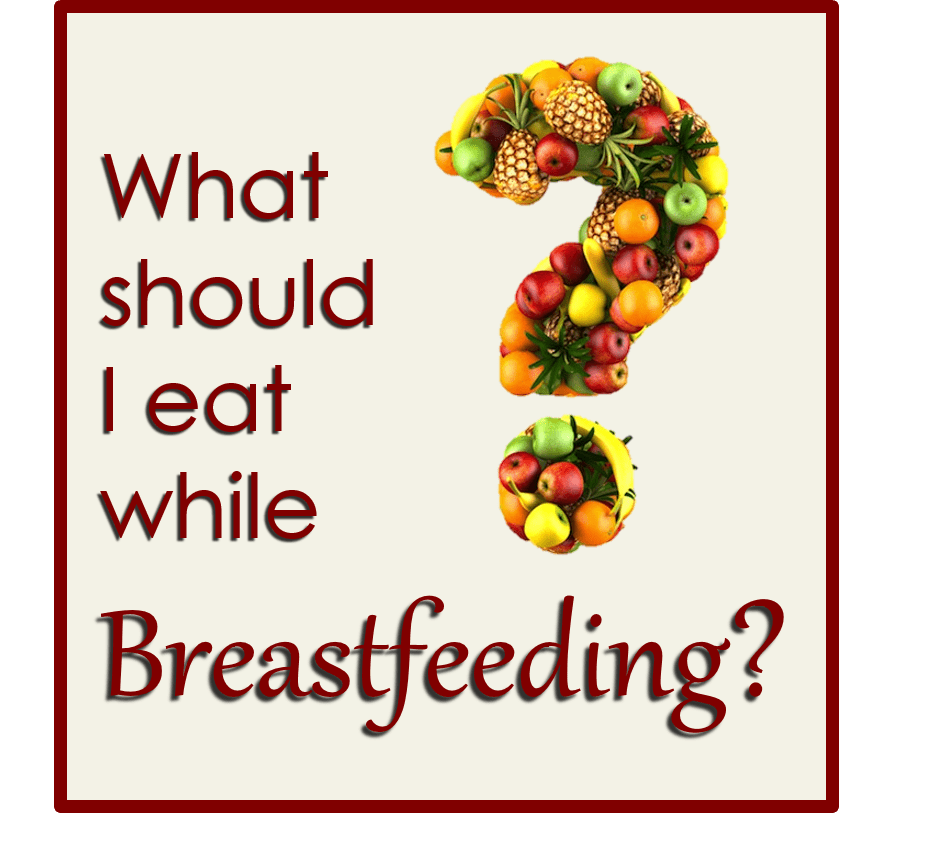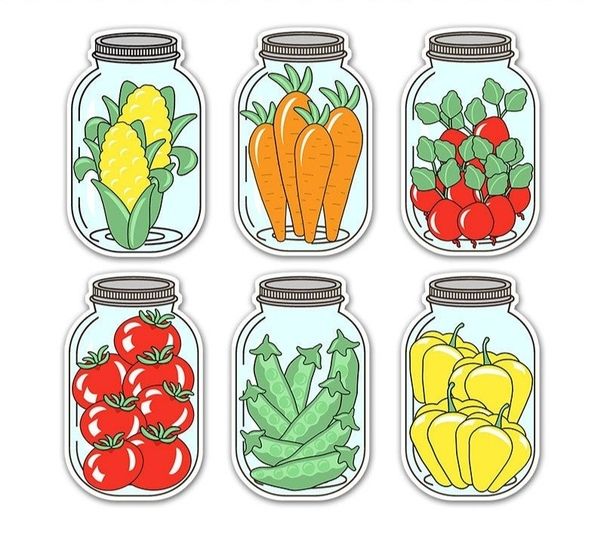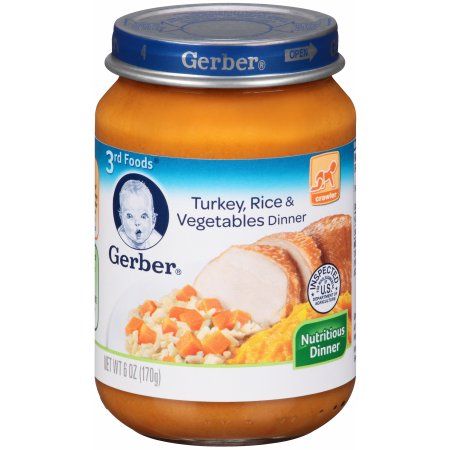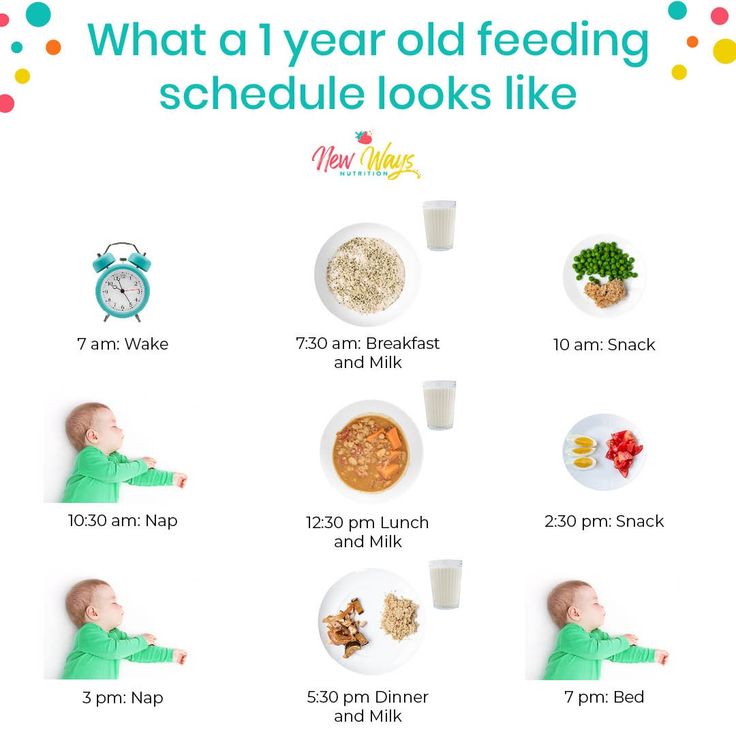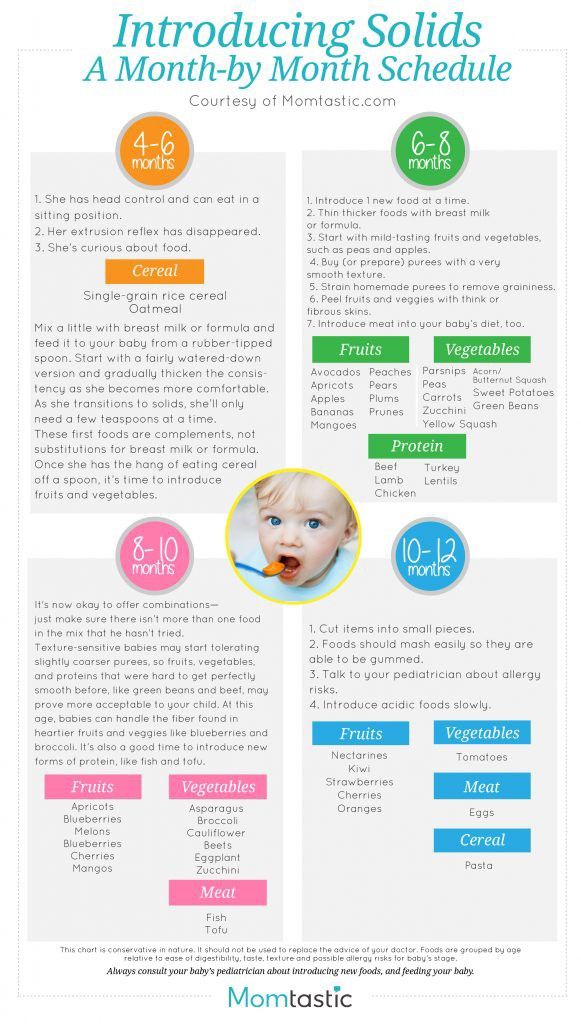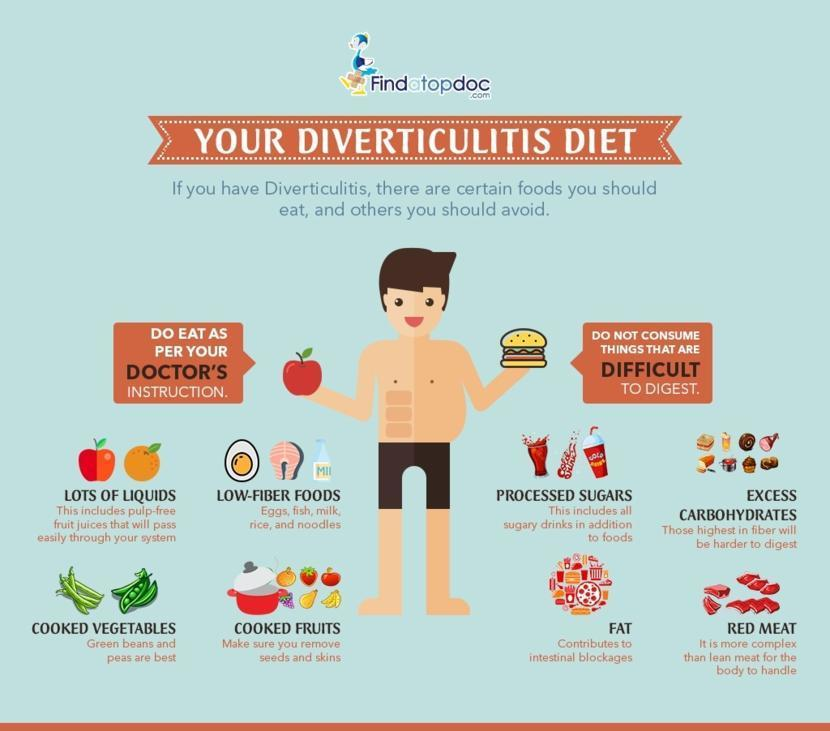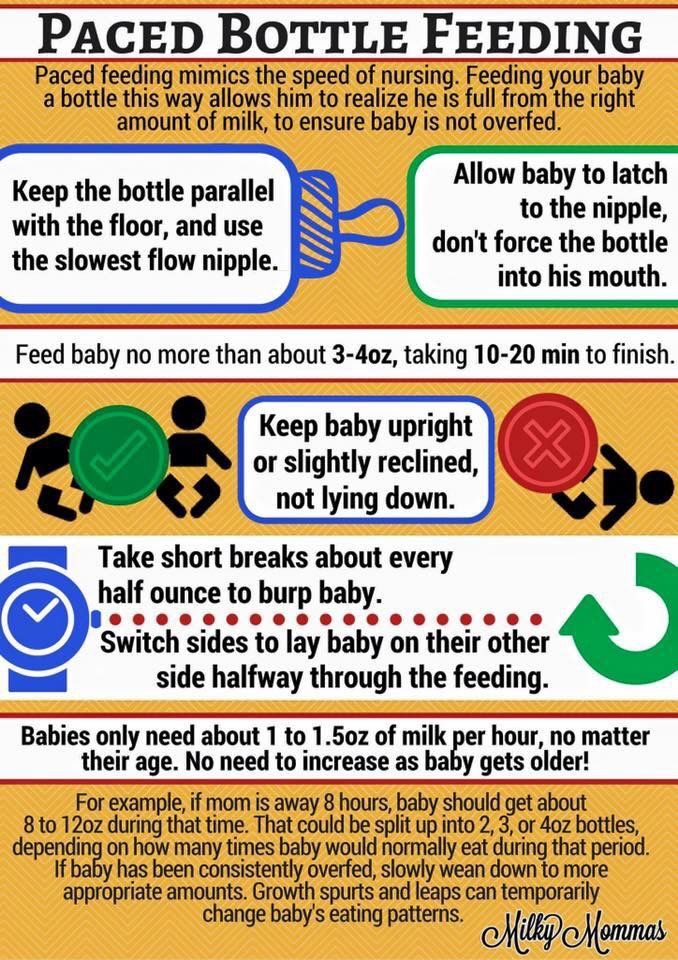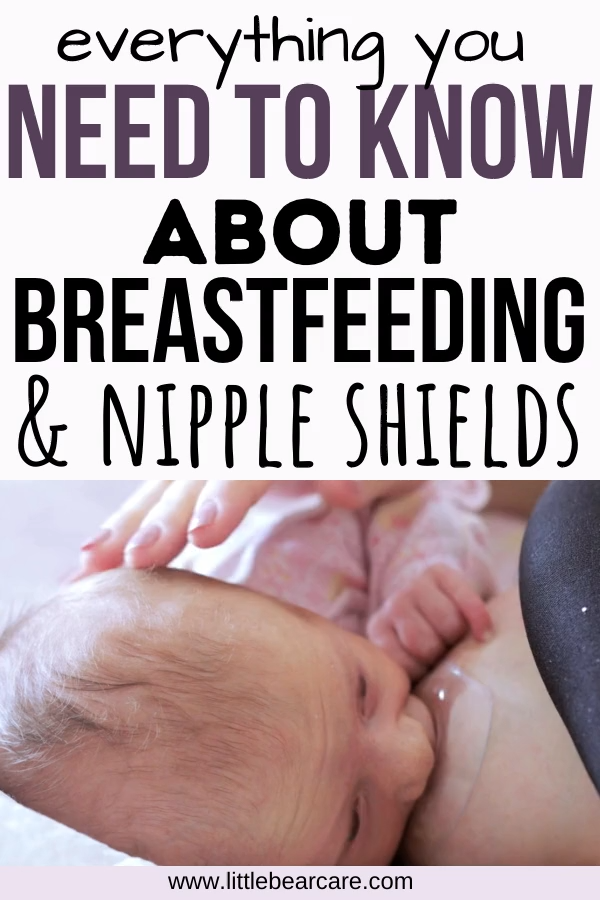Foods that can make a breastfed baby gassy
What You Can Do To Help Your Gassy Breastfed Baby
What are some common culprits behind your baby's gassiness? Learn the signs, foods that may cause gassiness in your baby, and how to soothe and relieve his or her symptoms.
Share this content
As a new parent, it can be stressful and upsetting to see and hear your baby cry. That’s especially true if you've checked off all the usual suspects— dirty diaper, empty belly, discomfort, or over-tiredness —and you still can’t seem to soothe your little one.
Gas is something that many newborns experience, and it can be painful for them! It isn't always the first thing that parents remember to consider, since it's not something easily visible.
Signs Your Breastfed Baby is Gassy
If you suspect excess gas could be the culprit causing your baby’s fussiness, there are several signs that may indicate you are correct:
- Burping. It’s possible your baby has swallowed too much air while nursing or crying for a long period.
- Spitting up. While spitting up is perfectly normal, gas that’s trapped in the stomach can push breast milk back up and cause your baby to spit up.
- Bloated tummy. This could be a sign that gas has built up in your baby’s stomach.
- Flatulence. Every baby toots, but if they’re doing so excessively, it could mean they have excess gas.
- Arched back, legs drawn toward the tummy. The discomfort from gas pains will make a baby try to adjust to alleviate it.
Gassy Baby Causes
Gas in a breastfed baby is not uncommon and can be attributed to several factors:
- Gulping while feeding. If your milk let-down reflex is strong, your baby may gulp your milk to keep up and swallow extra air in the process. If that’s the case, your little one may do better nursing in a more upright position, so he or she has better control over milk intake and flow.
- Introducing a bottle.
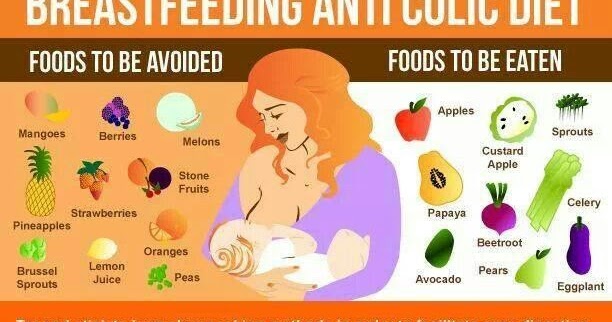 If your baby is used to the breast and you begin feeding with a bottle, it may take some getting used to at first. As a result, he or she may swallow too much air while eating.
If your baby is used to the breast and you begin feeding with a bottle, it may take some getting used to at first. As a result, he or she may swallow too much air while eating. - Constipation. When your baby is constipated, they may have gas trapped in their tummies that they’re having a hard time releasing.
- Crying. If your baby has been crying for a long time, they may be gulping in air in the process.
- Mom’s diet. Food that you’ve eaten can make your baby gassy as well. Certain foods such as dairy, soy or wheat may contribute to gassiness in your little one. Keep a food journal of what you eat to see if you can pinpoint the culprit in your diet.
Foods That Make Breastfed Babies Gassy
Though a baby’s gas is not commonly linked to mom’s diet, there are certain gas-inducing foods that could give both a breastfeeding mom and her baby gas. These include:
- Fiber. Foods like bran, beans, and whole grains.
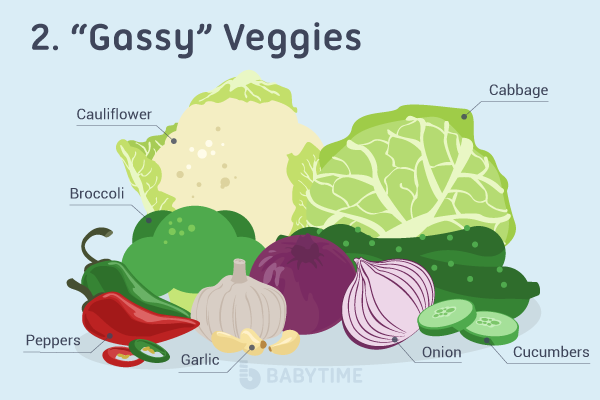
- Fruit. Citrus fruits, prunes, plums, peaches, or apricots.
- Vegetables. Broccoli, cabbage, and Brussel sprouts.
- Garlic. Garlic-seasoned foods like pasta dishes or garlic bread.
- Dairy. Yogurt, ice cream, or milk products.
- Carbonated beverages. If they make you burp, they could make your baby gassy too.
It’s not necessary to give up all your favorite foods when pregnant and/or breastfeeding. Health experts recommend only making dietary changes if you see a direct connection between something you’ve eaten and your baby's gassiness.
Additionally, if you’re still breastfeeding after your little one begins solids or finger foods, it’s easier to detect what food might be the culprit and then eliminate it.
Relieving Gassy Babies
There are several effective ways to help relieve your baby’s gas pains and soothe them. Try a combination of these to find what works best for your little one.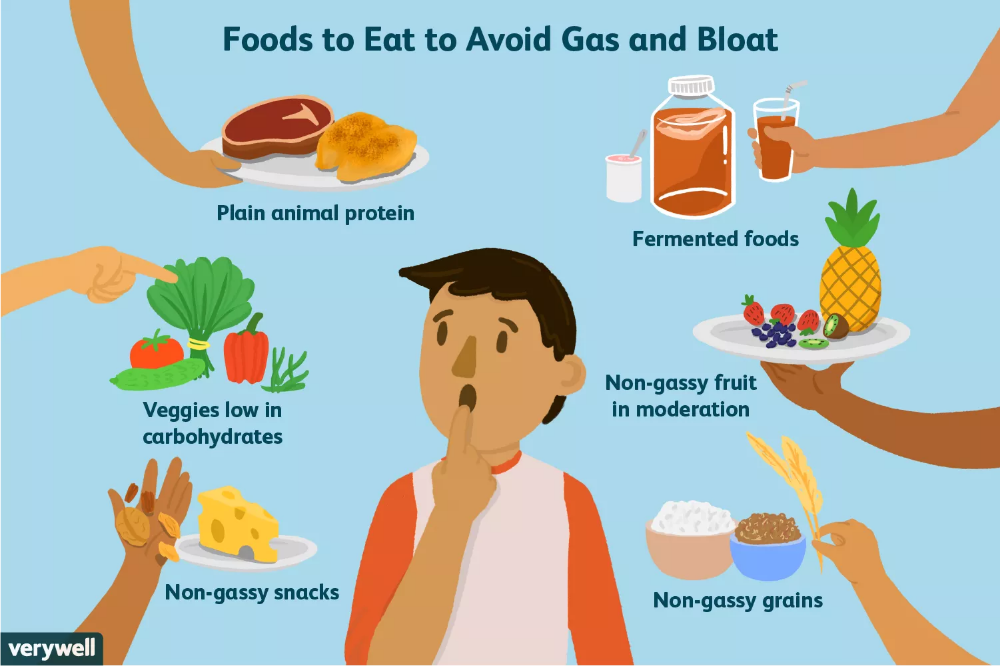
- Burp twice. Try to coax two burps out of your baby instead of just one.
- Sit upright. Hold your baby in an upright position while burping. This makes it easier to expel gas.
- Tummy time. Laying your baby on their tummy will help to push gas out.
- Bicycle exercises. Put your baby on his or her back and move their legs in a pedaling motion, similar to cycling on a bike. This helps with constipation as well.
- Massage the tummy. A gentle massage can help move gas out.
- Adjust baby’s latch. Make sure your baby is latching correctly to avoid swallowing too much air.
Don't worry, mama - Gas is typically a normal occurrence and most babies experience gassiness from time to time! With some minor adjustments, you can soothe your little one and help them get through the discomfort of gas.
Foods to Eat or Avoid When Breastfeeding
Reviewed by Poonam Sachdev on June 26, 2022
It’s a good source of protein.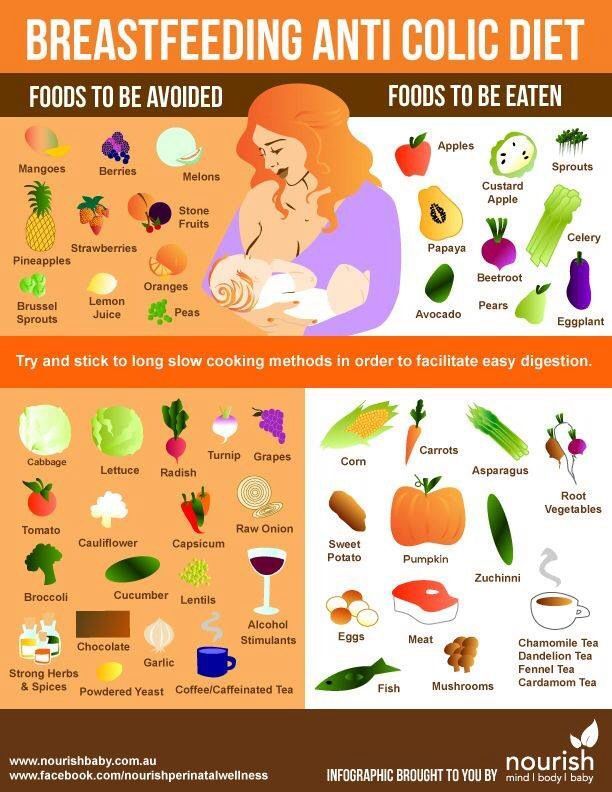 Some, like salmon and tuna, also give you omega-3s, which your body needs. But what about mercury and other contaminants? You can have cooked seafood twice per week. Each serving can be up to 6 ounces, which is the size of two decks of cards. Choose types that are lower in mercury, such as salmon, tilapia, and trout. Avoid shark, swordfish, king mackerel, and tilefish, which have high levels of mercury.
Some, like salmon and tuna, also give you omega-3s, which your body needs. But what about mercury and other contaminants? You can have cooked seafood twice per week. Each serving can be up to 6 ounces, which is the size of two decks of cards. Choose types that are lower in mercury, such as salmon, tilapia, and trout. Avoid shark, swordfish, king mackerel, and tilefish, which have high levels of mercury.
Love hot sauce? Most babies can handle it and other fiery foods in your diet. But if your little one is gassy or colicky and gets diarrhea every time you sprinkle red pepper flakes over your pizza, cut back on the heat for a few weeks to see if that helps.
They’re full of flavor. But some herbs may affect how much milk your body makes. For instance, eating a lot of parsley could curb lactation. And too much sage and peppermint may cut your milk supply. For some nursing moms, even peppermint-flavored toothpaste and candies are a problem.
It’s rarely a problem. But see how your baby does. Tell your pediatrician if your tot gets skin problems, has trouble breathing after breastfeeding, or has other symptoms.
Tell your pediatrician if your tot gets skin problems, has trouble breathing after breastfeeding, or has other symptoms.
As refreshing as your cup of chai or Earl Grey may be, it has some downsides. It’s got caffeine, which can affect your sleep – and your baby’s. It may also make it harder for your body to absorb iron, which you need for energy. If you drink hot or iced tea, try not to sip it when you eat foods that are rich in iron, such as lean meat; dark, leafy greens; and fortified breakfast cereals.
What if you aren’t allergic, and you want to prevent your baby from developing an allergy? Sorry, but there’s no proof that you can do that by skipping specific foods. Cutting certain foods out of your diet may make the skin condition eczema less likely for your little one. Ask your doctor or pediatrician for advice.
Breastfeeding can make you thirstier than you usually are. If that’s the case, drink a glass of water every time you breastfeed. But no matter how parched you feel, don’t go for regular sodas or fruit drinks, which give you calories without nutrition.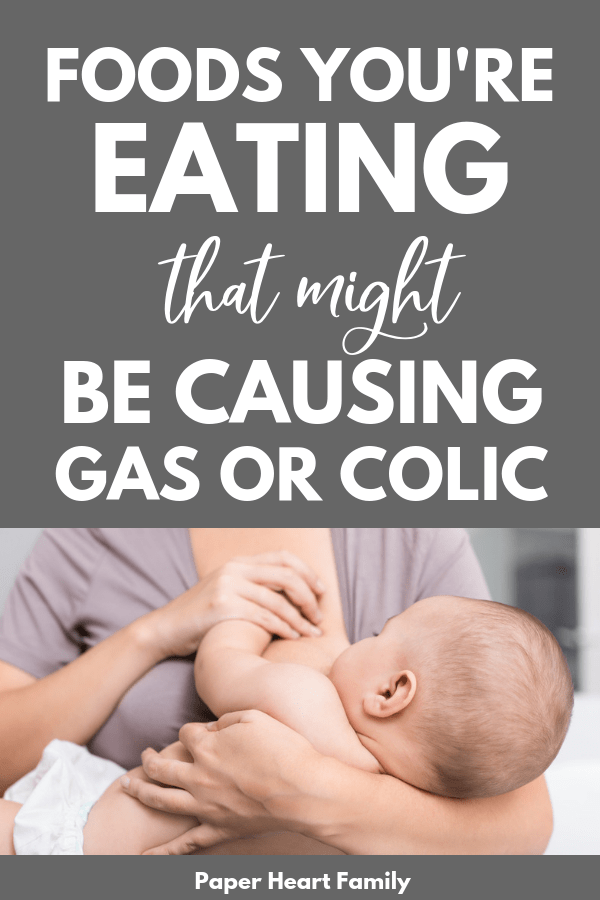
It's best for your baby if you don't have any booze at all. But if you do choose to drink, don’t breastfeed until the alcohol has completely cleared your milk. For 12 ounces of beer, 5 ounces of wine, or 1.5 ounces of liquor, wait at least 3 hours. Pumping doesn’t speed that up.
Common culprits include beans, broccoli, cabbage, and Brussels sprouts. Bloating, burping, and passing gas are normal. But if your baby is gassy or has colic, avoid these foods for a few weeks to see whether they relieve the symptoms.
Both have caffeine. You’ll also find it in energy drinks and cola. If you’re lost without your latte, limit yourself to 2-3 cups per day of the brewed kind. Or you could switch to decaf.
IMAGES PROVIDED BY:
1) Getty
2) Getty
3) Getty
4) Getty
5) Getty
6) Getty, iStock
7) Getty
8) Getty
9) Getty
10) Getty
SOURCES:
Mayo Clinic.
The Children's Hospital of Philadelphia.
La Leche League.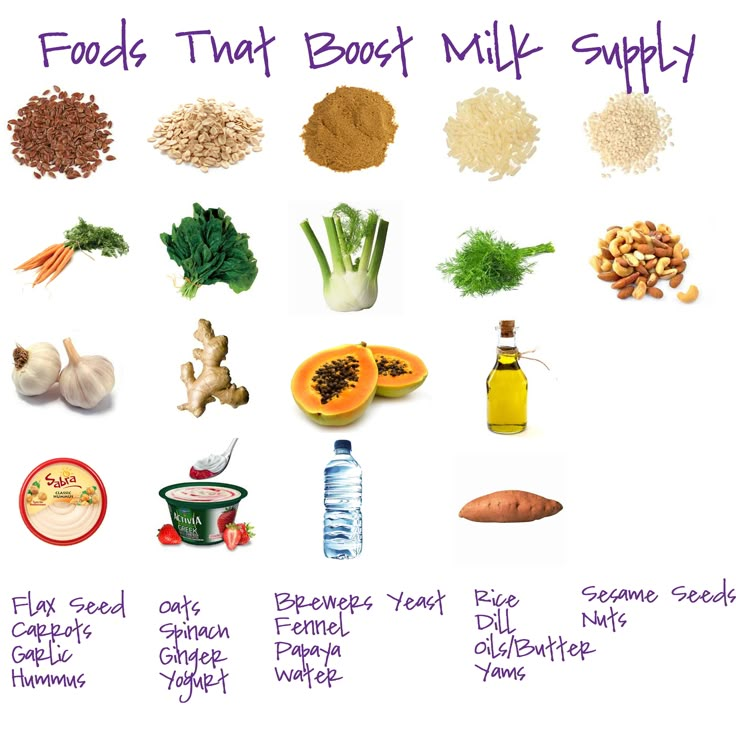
The American Academy of Pediatrics.
U.S. Department of Agriculture.
© 2022 WebMD, LLC. All rights reserved. View privacy policy and trust info
What foods in the mother's diet cause colic in the baby
12/28/2017
What foods in the mother's diet cause colic in the baby
Colic in the baby causes a lot of trouble for new parents. Gas formation in the intestines can cause anxiety and pain in the baby, which will be accompanied by prolonged crying. There are many tips on how to help the child and alleviate his condition. One of them is the revision of the diet of a nursing mother. nine0003
Substances contained in the mother's food enter the child's body through breast milk. Some foods increase the formation of gases, they can cause colic in a child. If this or that food is too rough for digestion by the stomach of an adult, then it will have an even stronger effect on the baby.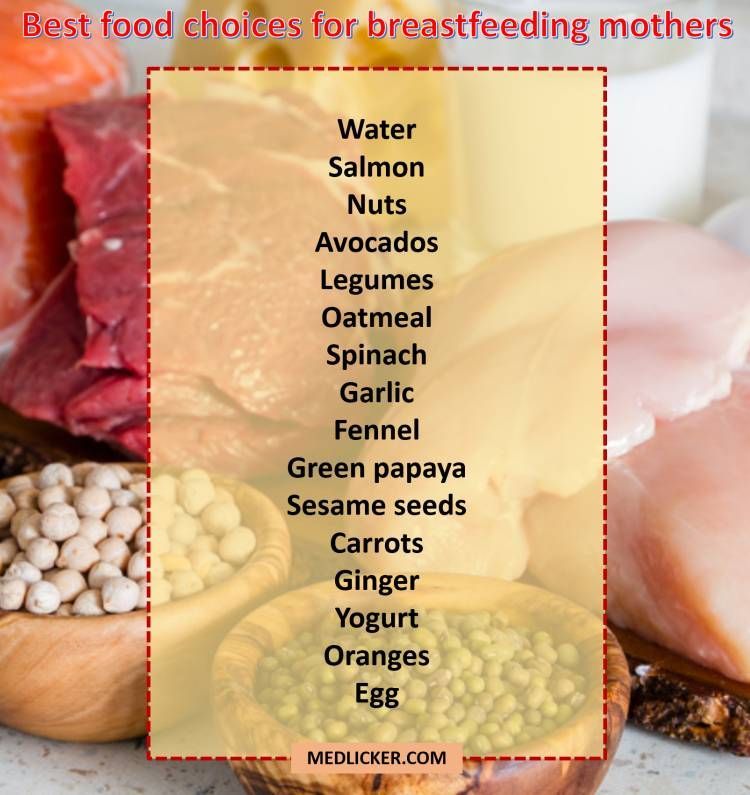 For this reason, we advise mothers to carefully monitor their own diet during lactation.
For this reason, we advise mothers to carefully monitor their own diet during lactation.
What foods should be excluded from the diet of a nursing mother? nine0003
Cow's milk . Many adults are lactose intolerant. If a nursing mother has bloating after drinking milk, you should refuse it. In terms of benefits, fermented milk products are much more valuable than whole milk. They are a source of calcium, protein and bifidus - and lactobacilli, which are so necessary for a nursing mother.
Brown bread . This product causes fermentation processes in the intestines. For this reason, at the time of breastfeeding, it is worth excluding it from the mother's diet. Black bread can be replaced with bread prepared without the addition of yeast. nine0003
Raw or pickled vegetables and fruits. These foods are rich in fiber, which causes flatulence in adults. During the period of breastfeeding, a mother should not completely abandon vegetables, they can be consumed baked, boiled or steamed.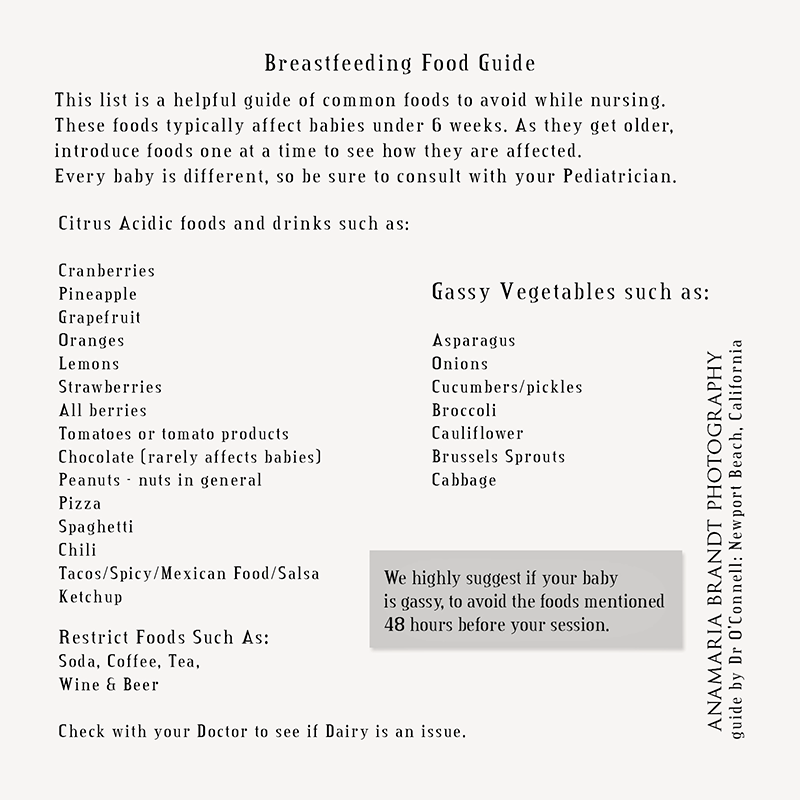 Fruits are strong allergens. The use of fruits by a nursing mother can cause diathesis in a child, which will become a prerequisite for the development of allergies in the future.
Fruits are strong allergens. The use of fruits by a nursing mother can cause diathesis in a child, which will become a prerequisite for the development of allergies in the future.
Legumes. Peas, beans, beans cause severe flatulence in adults, let alone babies. As an alternative, you can include tofu cheese in your diet. nine0003
Sweet and fast food. This category of products is very highly allergenic for the baby. Therefore, for mom - Fast food is strictly prohibited. Of all the sweets, oriental sweets are considered the safest for mothers in the diet - Turkish delight, gozinaki, halva, but in reasonable quantities.
As you introduce new foods into your diet, monitor your baby's well-being. If there is suspicion about a particular food, exclude it. The absence of colic in the baby will keep the good mood for both the baby and his parents. nine0003
12/28/2017
More news
Products that cause colic in newborns
The baby cannot fall asleep, at first glance it cries for no reason, behaves anxiously.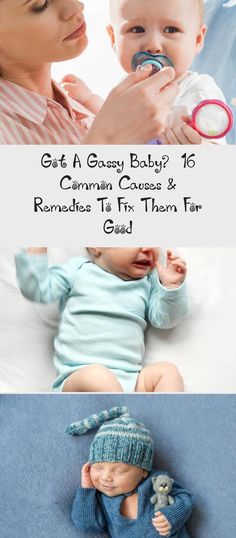 All this causes anxiety among young parents, who cannot immediately guess what is the main reason for such behavior. And the answer may lie on the surface. It’s just that mom didn’t follow a diet and allowed herself foods that cause colic in babies. As a result, the baby develops intestinal spasms, pain, which means that the little one begins to cry and spin. To prevent this from happening, the mother should monitor her diet by excluding foods that cause colic in children from the menu. nine0003
All this causes anxiety among young parents, who cannot immediately guess what is the main reason for such behavior. And the answer may lie on the surface. It’s just that mom didn’t follow a diet and allowed herself foods that cause colic in babies. As a result, the baby develops intestinal spasms, pain, which means that the little one begins to cry and spin. To prevent this from happening, the mother should monitor her diet by excluding foods that cause colic in children from the menu. nine0003
What foods can cause colic in a newborn
When composing your daily diet, exclude foods that cause colic in newborns. These include:
- Whole milk. The lactose contained in the composition refers to a substance that causes colic in newborns due to gas formation. This product is poorly absorbed by the baby's body and can cause, in addition to bloating, allergic reactions. In your diet, it is better to replace milk with kefir, curdled milk, fermented baked milk. nine0052
- Spicy sauces.
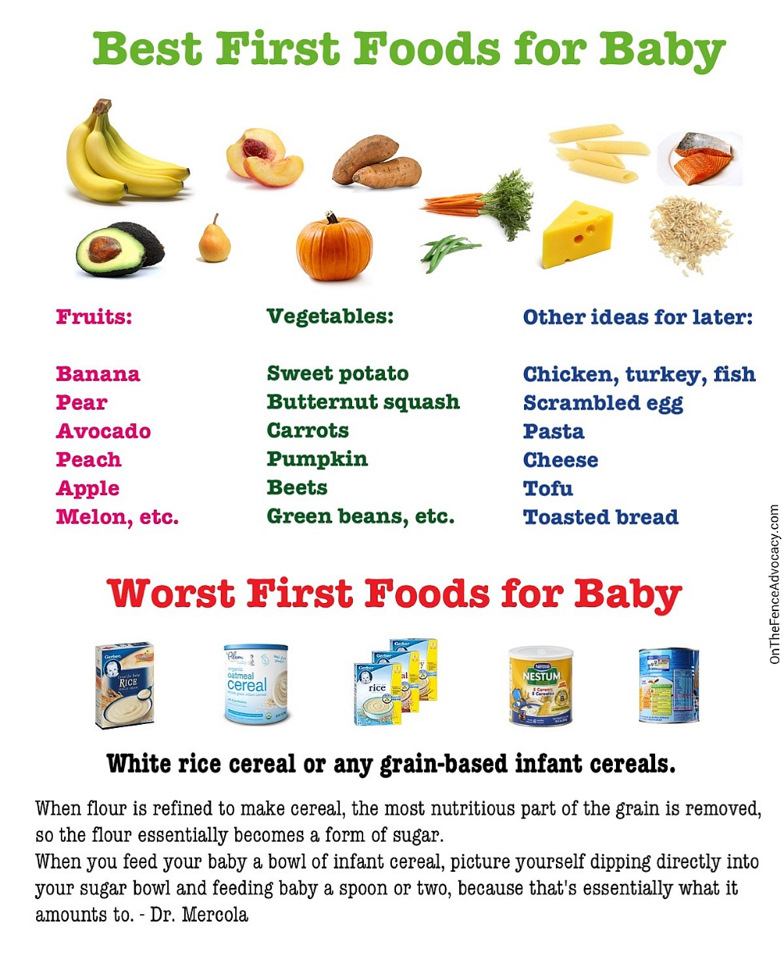 Ketchup, mayonnaise, mustard cause intestinal irritation, which causes colic in newborns, so it is not recommended to include these products in the menu of a nursing woman.
Ketchup, mayonnaise, mustard cause intestinal irritation, which causes colic in newborns, so it is not recommended to include these products in the menu of a nursing woman. - Black bread. The enzymes that make up the composition lead to gas formation. When breastfeeding, this product is best replaced with whole grain bread.
- Legumes. Lentils, corn, beans, peas are foods that cause colic in newborns. Instead, it is better to include other protein-rich foods in the diet of a nursing mother. For example, cottage cheese, soy cheese, low-fat fish. nine0052
- Raw vegetables and fruits. Flatulence causes fiber, and some fruits can cause an allergic reaction. Therefore, any vegetables and fruits should be heat treated.
- Sweets. Chocolate, sweets are among those products that cause colic in children. So it is better to give up your favorite delicacies. Carbonated drinks. Not only Fanta or Coca-Cola can cause colic in newborns, but also ordinary sparkling mineral water.
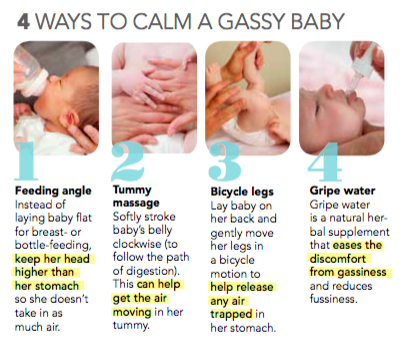 So you should accustom yourself to drinking weak tea or herbal decoctions. nine0052
So you should accustom yourself to drinking weak tea or herbal decoctions. nine0052
How to make a menu to save a newborn from colic
Knowing what foods cause colic in babies, any woman can make the right menu for herself. May include:
- Lean fish and meat.
- Cottage cheese, kefir, fermented baked milk.
- Buckwheat, rice, wheat groats.
- Baked vegetables and fruits.
It is important to consider not only what foods cause colic in newborns, but also to understand what can cause gas. In this regard, it is necessary:
- There are products separately without mixing them.
- Drink more clean water.
- Eat in small portions.
- Avoid exotic foods.
To increase the protective properties of the child's body, it is necessary to gradually introduce new foods into the diet. After all, the baby should prepare for nutrition not only with mother's milk. And at this stage it is very important to reduce the formation of colic.